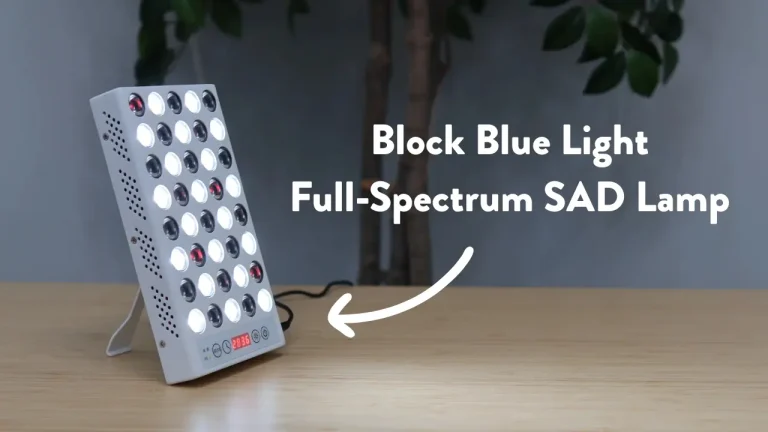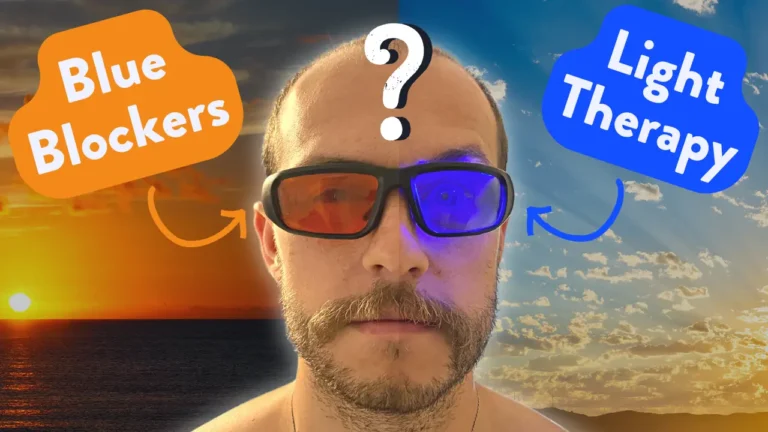Lumie makes some nice looking SAD lamps, but are they worth buying?
In this article, we’ll be going over their features, as well as testing them with our lab-grade spectrometer to see if you’re getting what you pay for!
The SAD Lamps
I was able to get my hands on 3 Lumie lamps; the Halo, Vitamin L, and Mini.
We went ahead and placed these lamps 1 foot from our spectrometer and tested them to add them to our database!
So without further ado, let’s get right into my thoughts on these!
Halo
The Halo is the flagship SAD lamp from Lumie and boy does it show!
This thing is gorgeous to look at.

It’s built out of metal and glass with no plastic to be found, this thing is heavy too, weighing in at around 4.5 lbs, so it also feels like the premium product that it is.
If you’re looking for an eye-catching conversation starter as well as a nice lamp for the winter blues, look no further!

Around the back is where the power cord plugs in and also where you’ll attach the magnetic feet.

To use the Lumie Halo, you can simply turn it on by tapping the capacitive power button on the top of the lamp.
To change the brightness and color temperature, you just slide your finger along the “lumie” logo.

This will shift the lamp from its warmest LEDs to its coolest, and then finally to a combination of the two which results in its brightness setting.
The right-most button turns on the evening mode which enables the warm LEDs only. You can then change the brightness of these by gliding your finger across the top of the “lumie” logo once again.
The Halo also has a special mode where you can turn on only the backlight, which will give you a very warm gentle glow off the copper backplate.

This gives the lamp a sort of warm fireplace glow that’s perfect for late at night.
Overall I’m really impressed with this thing! I was actually blown away by the packing and build quality, way beyond any other SAD lamp out there.
If you’re looking for something a bit more elegant to have on your desk than the typical white plastic lamp, I’d definitely consider this one.
Vitamin L
The Vitamin L from Lumie is sort of the middle-ground option, offering a decent, flicker-free light source with a nice build quality.
It’s got a physical button around the back that feels great to press! (I love me a good button)
Using the Vitamin L is simple, there’s just one brightness and one color temperature.
It puts out around 5,700 lux at 1 foot and a color temperature of around 4050K makes it a warm light much like the morning sun.
Couple that with a glare of only 91 and you’ve got yourself an effective and visually comfortable SAD lamp!
Mini
The Lumie Mini is one of the best-built compact light therapy lamps I’ve tested and, quite frankly, the only one with a physical button.
I’m a big fan of the feeling of pressing an actual button, so it’s nice to see one on this guy.

Its operation is dead simple. Press the button, and that’s it—one brightness setting and one color temperature.
The Mini puts out around 3,900 lux at 1 foot and has a color temperature of around 3950K, which is quite similar to the color of the rising sun!
And with a glare rating of only 102, it’s quite comfortable!
An alternative to the Mini worth looking at might be the HappyLight Alba. You can read more about our HappyLight review here.
If you’d like to investigate more lamps, just check out our database!
















Hello! I had a question regarding the vitamin L lamp, in all of Lumie’s advertising i have seen that they market this as a 10,000lux lamp so i was curious as to how it can only have been measured as 5,700 lux as written in the article. Thanks!
Hey Jonas, great question!
The “10,000 lux” claim is quite common in light therapy lamp marketing, but it can sometimes be misleading. Lux measures the amount of light reaching your eyes, and technically, almost any lamp can achieve “10,000 lux” if you’re close enough to it. For consistent comparisons, we measure all lamps at a distance of 1 foot. This means the actual lux level might be slightly above or below the advertised 10,000 lux depending on the lamp.
The Vitamin L claims 10,000 lux at 20cm or 8 inches and I do believe it achieves this.
Hello Derek! Would Vitamin L work with a smart Wi-Fi outlet? I was thinking about setting it to switch on in the morning to wake me up.
Hi Vira, yes that should work! It uses a physical switch for power.